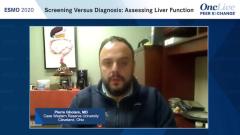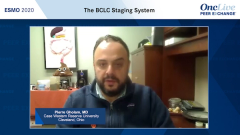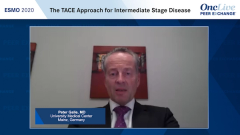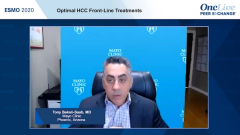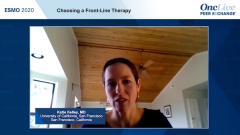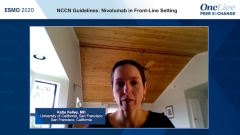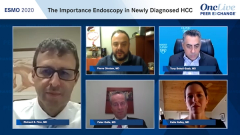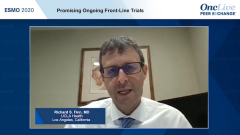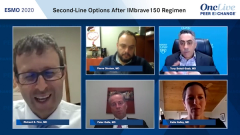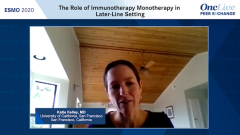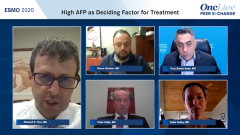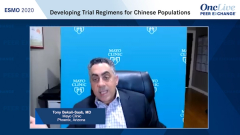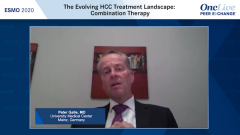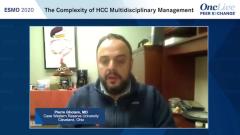
Developing Trial Regimens for Chinese Populations
Episodes in this series

Richard S. Finn, MD: Tony, as we start to wrap things up, there are some new drugs that we heard about in the past few months and at ASCO [the American Society of Clinical Oncology annual meeting]. One of them is apatinib, it’s a small molecule, and there was a study done in China of apatinib vs sorafenib. Can you comment on that study?
Tony Bekaii-Saab, MD: What you’re referring to is the second-line study with placebo vs apatinib, but there are also studies moving into the first-line setting. There is also dovitinib. Apatinib it is not a new drug to us. It’s been looked at in gastric and colorectal cancer. In fact, it had positive data in China that, unfortunately, were not duplicated in the Western population. It was negative in the Western population. Looking at the data, it looks similar to what you would expect for an agent in this class. Apatinib is similar to lenvatinib, regorafenib, and cabozantinib, so it’s in that class of agents. The results, unsurprisingly, showed positive elements. I’m not sure how much it will add value to our landscape, in all frankness.
That’s part of the limitation of how to take these data. Especially since it was done in China only. That’s not to say that there’s anything wrong with that; it is just to say that other studies with apatinib that were done in China only were not able to replicate the same results when moved to a larger scale in different diseases. Even if it is positive, if it moves to a Western patient population, I’m not sure it’s going to add much value to the landscape we have.
Richard S. Finn, MD: Yes. With China, certainly in liver cancer, the biology is different. A majority of it is hepatitis B vs our hepatitis C and NASH [nonalcoholic steatohepatitis]. You corrected me: there was a newer small molecule also from China that went head-to-head vs sorafenib at ASCO, and it was the first TKI [tyrosine kinase inhibitor] to beat sorafenib. Again, it was in a Chinese population.
Tony Bekaii-Saab, MD: Exactly. That was dovitinib.
Katie Kelley, MD: Donafenib.
Richard S. Finn, MD: Say again, Katie.
Katie Kelley, MD: It’s donafenib.
Tony Bekaii-Saab, MD: Donafenib. You’re right, it’s donafenib. It’s again similar to the TKIs that showed superiority to sorafenib, but it is unfortunately limited to China only. The same problem is that the difference was small, and it is unlikely, at least historically, to beat an IO [immune-oncology] combination. What we’re seeing is that at this point, a single agent, as everyone has referred to, may not be the way to continue moving forward in this disease. Combination seems to be the better pathway even when you fail the first IO doublet in the first-line setting.
There are certainly, as Katie mentioned and others did as well, a lot of doublets that are being looked at in the first-line setting. Unfortunately, there are not as many in later lines of therapy, and that is when we need them. With that said, there is only 1 doublet that is exciting to us if the data pan out, and that’s the PD-1 plus CTLA-4 inhibitor, or PD-L1 plus CTLA-4 inhibitor, because of the specific issue that we just discussed with patients who may not be eligible for VEGF inhibitors or those who have issues.
Richard S. Finn, MD: That’s a good point.
Tony Bekaii-Saab, MD: If those data are positive, that’s the only one that ends up with value in the first-line setting. I want to touch a bit on the biomarker issue. We are so limited on biomarkers, and there was a study from Chinese patients that looked at biomarkers associated with hyperprogression. It has limited data; it’s limited in its scope but large in its number of patients who were included, primarily looking at alterations such as EGFR alterations and PIK3CA and others. It seems that there may be hints, and that’s to Peter’s point: what we’ve had all these years are hints here and there about biomarkers that may have relevance but we have never consolidated the effort to the point where we integrated them into all of these. Think about how many phase 3 studies have been conducted in this space, yet we have no clue what the heck we’re doing.
All we can think about is alpha-fetoprotein [AFP]. No offense to my hepatologists. AFP is important, but if that’s the only biomarker I can get, I am not a happy dog. One more thing, the anti-drug antibodies [ADAs] are important, but they’re not good determinants of negating the activity. It’s neutralizing antibodies that are more relevant than anti-drug antibodies. In fact, anti-drug antibodies tend to correlate with a higher response rate, which could be a surrogate for antitumor activity.
The problem with atezolizumab is that it has, as Katie mentioned, the highest reported rate of anti-drug antibodies, but they have not reported in any study the neutralizing antibodies. Looking at the history, it seems that neutralizing antibodies account for about 10% of ADAs. If we do the math, it would be about 3% to 4%, just guessing, of patients on atezolizumab who will have neutralizing antibodies, and those may be the patients who may not benefit as well from these agents.
Transcript edited for clarity.


